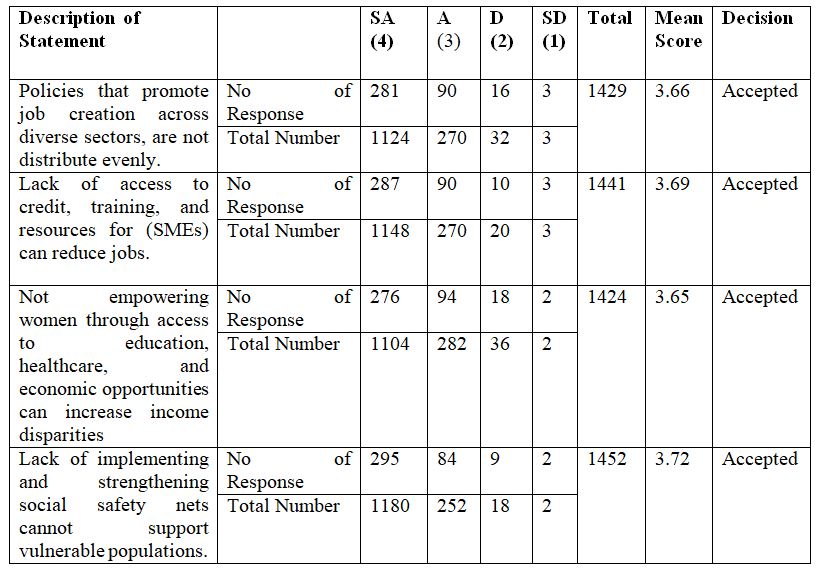Poverty Eradication: Does a Decrease in Income Inequality Matter for Poverty Reduction? Evidence from Nigeria’s Poverty Trends
DOI:
https://doi.org/10.5281/zenodo.15314410Keywords:
poverty, income, quality, poverty reductionAbstract
This study examines the impact of income equality on poverty reduction from the perspective of Nigeria. The research design adopted for the study was the descriptive survey research design. It made use of cross-sectional method. The simple random sampling technique was used to select 400 respondents from Three LGAs (Apapa, Epe, Alimosho and Amuwo) in Lagos using Taro Yamene sample calculator. The data collected from the field was analysed using mean and standard deviation. This study highlight significant causes of income inequality in Nigeria and identified disparities in educational opportunities as a key driver, leading to skill gaps and restricting access to well-paying jobs for less-educated individuals. Additionally, economic development remains concentrated in urban centres like Lagos and Abuja, while rural areas, particularly in the North, experience slower growth and higher unemployment rates. Many individuals, especially youth, are engaged in low-paying informal jobs, further exacerbating income inequality. The study recommended that the government should invest in equitable education policies, ensuring that all regions, especially rural areas, have access to quality education and vocational training. Expanding scholarship programs and skill development initiatives will help bridge skill gaps and improve employment opportunities. Economic policies should promote balanced regional development by investing in infrastructure, industries, and job opportunities in rural and underdeveloped areas.
Downloads
References
Akuta, C.V. (2009 July 10). Abandoned government projects. Lagos: Daily Sun.
Collier, Paul (2017). The bottom billion: Why the poorest countries are failing and what can be done about it. Oxford and New York: Oxford University Press.
Gbosi, N. G. (2012) Modern labour economics and policy analysis. (2nd ed.). Ebonyi State, Nigeria: Pack Publishers.
Gbosi, N. G. (2015). Contemporary macroeconomic problems and stabilization policies. (2nd ed.). Benin City, Nigeria: Spirit and Truth Publishers, pp. 164.
Krokeyi, W. S, & Obayori, J. (2020). Income distribution and poverty reduction in Nigeria. Journal of Management Science & Entrepreneurship, 20(7), 42-50.
Lawal, T., & Oluwatoyin, A. (2021). National development in Nigeria: Issues, challenges and prospects. Journal of Public Administration and Policy Research, 3(9), 237-241.
Mefor, L. (2023). Psychological effects of poverty and implications for patriotism. Retrieved from: www.elombah.com/index.php/articles.
National Bureau of Statistics (NBS). (2020): 2019 poverty and inequality in Nigeria: Executive summary (2019) National Bureau of Statistics Report. Date: May 2020.
Obayelu, A. E., & Edewor, S. E. (2022). Economic Inequality and Poverty Dynamics: What does Literature tell us?. International Journal of Social Sciences and Economic Review, 4(4), 21-31.
Obayori, J. B., Udeorah, S. & Aborh, K. B. (2018). Human capital investment and poverty reduction in Nigeria. International Journal of Research in Business, Economics and Management, 2(1), 104-115.
Oluwatayo, I. B. (2018). Explaining inequality and welfare status of households in rural Nigeria: Evidence from Ekiti State. Humanity & Social Science Journal, 3(1), 70-80. http://www.idosi.org/hssj/hssj3(1)08/9.pdf.
Onyemenam, C. T. (2013). Poverty in Nigeria: Poverty reduction programs in Nigeria. Retrieved from: www.articlesng.com/poverty-in-nigeria.
Oyekale, A. S., T. O. Oyekale, & A. I. Adeoti. (2017). Regression-based approach to income inequality decomposition in rural and urban Nigeria. International Journal of Economic Perspectives, 1(2), 45-54.
Todaro, M. P., & Smith, S. C. (2011). Economic development. (11 ed.). Grate, Harlaw, England: Pearson Education Limited, Edinburg.
Tubotamuno, B., Inimino, E. E., & Awortu, T. C. (2018). Public health expenditure and poverty in Nigeria. African Journal of Applied and Theoretical Economics, 4(2), 100-126.
Umo, J. U. (2012). Escaping poverty in Africa. A perspective on strategic agenda for Nigeria. Nigeria: Millennium Text Publishers Limited.

Published
How to Cite
Issue
Section
License
Copyright (c) 2025 Kehinde Emmanuel Agbeni, Adedoyin Judith Gbadebo, Chukwuka Obumneme Chukwuemelie

This work is licensed under a Creative Commons Attribution 4.0 International License.
Research Articles in 'Management Journal for Advanced Research' are Open Access articles published under the Creative Commons CC BY License Creative Commons Attribution 4.0 International License http://creativecommons.org/licenses/by/4.0/. This license allows you to share – copy and redistribute the material in any medium or format. Adapt – remix, transform, and build upon the material for any purpose, even commercially.









